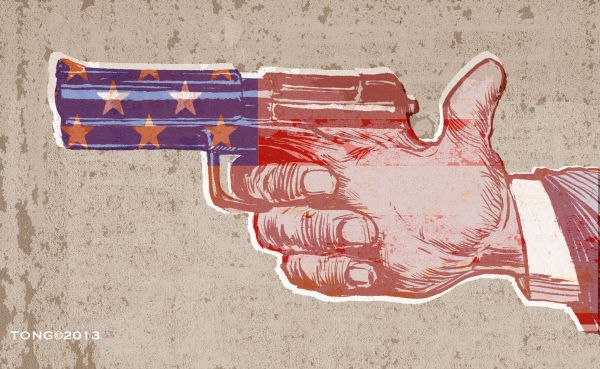As the dust settles this week on yet another mass shooting in America, the issue of gun-control has once again reared its ugly head. However, this was certainly not the first incident, and nor will it be the last.
It was approximately 8.20 a.m. on the 16th September when Aaron Alexis, a former U.S. Navy reservist armed with AR-15 rifles and a handgun, opened fire at a Washington Navy Yard, killing 12 people and wounding several others. The fallout from the shooting has been the same as we have seen from such shootings in the U.S. in the past; uproar, grieving, and reflection on the events that have occurred. Yet one reaction we have not seen, and will not see, is the reaction of change to the nation’s gun laws. Why is this?
It is not as if this is the first incident, in fact far from it. It was as recently as July 2012 that James Holmes opened fire in a packed cinema auditorium, killing 12 and wounding a further 70. Even more recent were the shocking events that unfolded in December 2012 at Sandy Hook elementary school in Connecticut, where shooter Adam Lanza killed 26, 20 of whom were schoolchildren, in one of the worst incidents of gun violence in U.S. history. All 3 involved several fatalities; all 3 were carried out using a firearm. The solution, at least to you and I, could surely not be any simpler.
However, it is far from simple in the U.S. The ‘right to bear arms’ is enshrined in U.S. law in the second amendment to its Constitution, and the U.S. Constitution is notoriously difficult to amend, with a two-thirds majority being required in each house of Congress for one to be passed. But surely common sense should prevail given the continued slaughter of innocent civilians, right? Wrong. Many Americans, particularly those affiliated with the Republican Party, see it as a God given right to possess firearms to protect themselves. Indeed, the National Rifle Association, or NRA, has a current membership of over 5 million and rising, and perversely sales of firearms only seem to increase in the aftermath of shootings such as the ones mentioned above. It is a vicious cycle, yet one which shows no sign of coming to an end.
The influence of the NRA in top level politics in the U.S. is another reason for any proposed gun control legislation failing to be passed. One of the most powerful pressure groups in Washington, the NRA donates vast sums of money to various Politicians election campaigns in return for support for their views. Their relative power was evidenced by the differing responses to the Sandy Hook massacre. The NRA response, not surprisingly, was to suggest placing armed guards at schools to prevent such attacks occurring again, whereas the Obama administration’s response was to propose tighter gun controls, such as background checks for every purchase of firearms as well as a much tighter ban on the possession of semi-automatic weapons. The proposals were put to a vote in the Senate and, despite polls showing as many as 90% of Americans supported the amendments, only gained 55% of the required 67% needed. Such a demoralising outcome begs the question that, if the murder of 20 schoolchildren wasn’t enough for America to see the light in relation to gun laws, what will be?
Many supporters of gun rights claim that even if tighter restrictions were imposed, it will still not stop senseless killings. It is people, they claim, that carry out the killings, not the guns. While this is true to an extent, taking the ability to use such weapons away from those who would carry out attacks like the ones mentioned above can only be a step in the right direction. Britain, which has an outright ban on the possession of firearms, had a total of 35 gun related deaths in 2013, compared to America’s figure of over 11,000. Perhaps a better example is Australia, which until 1996 had similar gun laws to the U.S., until the Port Arthur massacre in which 35 people were killed prompted sweeping gun control reforms. These included an outright ban on the possession of semi-automatic weapons and tight restrictions on the possession of any other firearms. There has not been a single mass-shooting in Australia since the laws were introduced.
Addressing a service for the 12 killed at the Navy Yard this week, President Obama made reference to the “sweeping resignation” that seems to dog America after such mass shootings; “After the round the clock cable news; after the heart-breaking interviews with families; after all the speeches and all the punditry and all the commentary – nothing happens”. Names such as Michael Arnold, Sylvia Frasier, Kathy Gaarde and Frank Kohler should be the catalyst for a change in America. Past experience, however, shows that they will almost inevitably become just another statistic in the U.S.’s seemingly endless list of victims of such crime.

